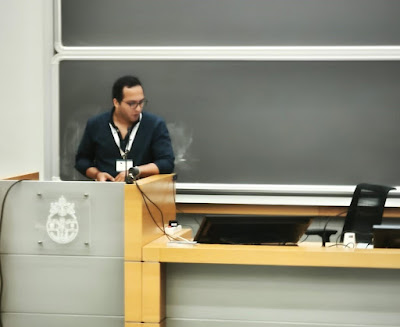From June 30 to July 5, 2025, our team had the honor of actively contributing to the International Joint Conference on Neural Networks (IJCNN 2025), held this year in the heart of Rome, at the prestigious Pontifical Gregorian University. With nearly 2,000 attendees from all over the world, IJCNN 2025 confirmed its role as one of the premier venues for advancing neural network theory, applications, and interdisciplinary dialogue in AI.
While the Roman summer heat proved intense, the conference was intellectually energizing. Our team from CIPAR Labs (Department of Information Engineering, Electronics and Telecommunications, Sapienza University of Rome) took part in a variety of roles: as organizers, speakers, and authors of innovative research at the intersection of AI, smart grids, and complexity science.
One of the standout moments of IJCNN 2025 was the keynote speech by Samy Bengio, Head of AI and Machine Learning at Apple Inc., and a foundational figure in deep learning research. In his talk, Bengio offered a nuanced and thought-provoking perspective on the current state and limitations of large language models (LLMs). While expressing healthy skepticism about their reasoning capabilities, he also highlighted their immense untapped potential, especially when trained on carefully structured and sufficiently rich datasets. After the keynote, we had the opportunity to engage in a stimulating conversation with him, discussing the future trajectories of neural architectures and the balance between performance and interpretability. It was a meaningful exchange that reaffirmed how even at the frontiers of AI, curiosity and critical thinking remain essential drivers of innovation.
Organizing CISEM 2025: Computational Intelligence for Sustainable Energy Management
We proudly organized the CISEM 2025 Workshop — Computational Intelligence for Sustainable Energy Management in Microgrids and Renewable Energy Communities. The workshop addressed the growing demand for intelligent, interpretable, and efficient energy systems, presenting novel techniques for:
-
Smart grid optimization and predictive maintenance
-
Time-series forecasting
-
Multi-agent systems in decentralized energy infrastructures
-
Integration of Explainable AI (XAI) and cybersecurity frameworks
The workshop attracted a multidisciplinary audience and was praised for its balance between theory and real-world applications. Contributions came from both academia and industry, reinforcing our commitment to bridging AI research and sustainable energy innovation.
Thanks to Giulia Tanoni (Università Politecnica delle Marche (UNIVPM)) for her tutorial by the title: "Unlocking the potential of industrial non-intrusive load monitoring and future opportunities".
Co-Chairing the AICS Special Session: Artificial Intelligence and Complex Systems
Another milestone was co-organizing the first edition of the AICS Special Session – Artificial Intelligence and Complex Systems. This track explored deep connections between:
-
Complexity theory and neural computation
-
Emergence, stochastic dynamics, and agent-based modeling
-
Philosophical, linguistic, and cognitive perspectives on AI systems
-
Foundations of intelligence and model explainability
The AICS session stood out for its interdisciplinary ambition, offering a space where cognitive science, philosophy, and deep learning could meet. We are excited to evolve this session into a full workshop at next year’s conference.
Tutorial: Predictive Maintenance Meets Industry 5.0
During the DLT-4-OSGE Workshop (Deep Learning Techniques for Observable Smart Grid and Sustainable Energy Systems), Prof. Enrico De Santis delivered the tutorial:
“Machine Learning Techniques for Predictive Maintenance, Energy Efficiency and Industry 5.0 Applications”
The session focused on:
-
Practical AI architectures for maintenance in industrial and energy systems
-
Use of interpretable models (like, Clustering, KANs and SHAP) for actionable insight
-
Applications in smart buildings, plants, and Renewable Energy Communities
The tutorial generated vibrant discussions and established the relevance of XAI in high-stakes energy contexts.
Research Papers: Seven Contributions Across Three Tracks
DLT-4-OSGE Workshop
-
On a Fast and Explainable REC HEMS Based on Kolmogorov-Arnold Networks
Capillo, De Santis, Rizzi
KANs optimized with Genetic Algorithms for REC energy management, delivering high accuracy and 10% faster inference with explainable output. -
Decision Focused Forecasting for Smart Grid Energy Management Systems
Ferro, De Santis, Capillo, Rizzi
End-to-end LSTM forecasting via Decision Focused Learning, reducing operational costs by 11% over standard pipelines. -
Multi-Objective Battery Dispatching using an Enhanced SAC Algorithm
Zendehdel, De Santis, Capillo, Odonkor, Rizzi
A Lagrangian-penalized SAC algorithm to optimize battery dispatch, improving self-sufficiency ratio (SSR) by 18.2%.
CISEM 2025 Workshop
-
Graph-Augmented LSTM with Weighted Loss for Enhanced Energy Forecasting
Taghdisi Rastkar, Jamili, De Santis, Rizzi
Incorporates a GAT-based feature graph and peak-aware loss for accurate, interpretable load forecasting during critical periods. -
A KAN–SHAP Framework for Fault Detection and Analysis in Smart Grids
De Santis, Ferro, Rizzi
Combines Kolmogorov–Arnold Networks with SHAP to classify grid faults with ROC AUC 0.993, enabling actionable fault interpretation and predictive maintenance in the ACEA MV grid.
AICS Special Session
-
LSTM in Recursive Feedback Loops: A Study on Textual Evolution and Complexity
De Santis, Martino, Ronci, Rizzi
Theoretical study of semantic self-organization in recursive LSTM generations, analyzing how complexity and feedback impact text evolution. -
2025: A GPT Odyssey. Deconstructing Intelligence by Gradual Dissolution of a Transformer
De Santis, Martino, Bruno, Rizzi
A HAL 9000-inspired investigation: sequential ablation of GPT-2 layers reveals semantic and structural roles in generative performance, opening paths to explainability in large language models.
Final Reflections
Beyond the papers and presentations, what made IJCNN 2025 so memorable was the spirit of collaboration: colleagues from Brazil, UAE, Spain, UK, and Italy shared not only research, but laughter, meals, and vision.
In a world often divided, the conference served as a reminder that scientific cooperation transcends borders, and that intelligence – whether artificial or human – grows best through connection.
We’re grateful to all our co-authors, collaborators, organizers, and peers who contributed to this vibrant experience.
See you next year in Maastricht at WCCI 2026!










No comments:
Post a Comment